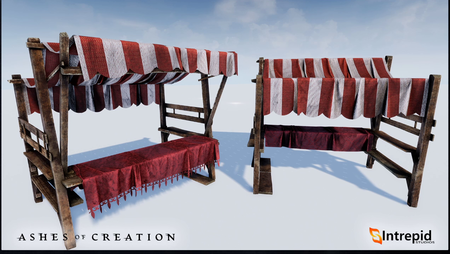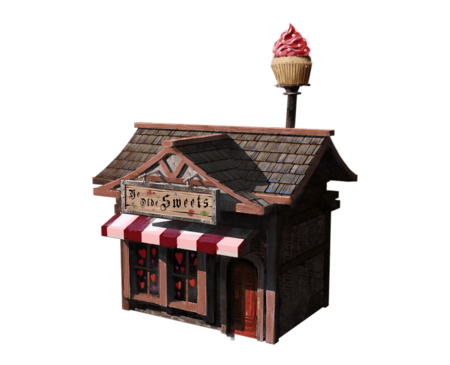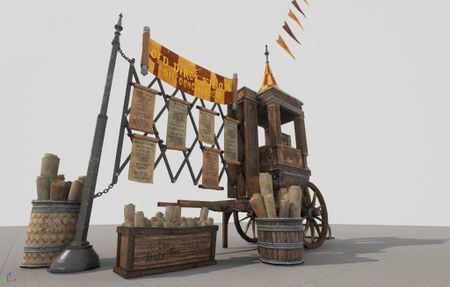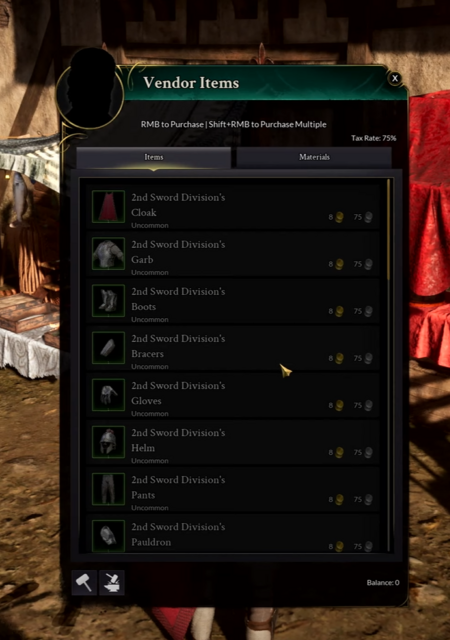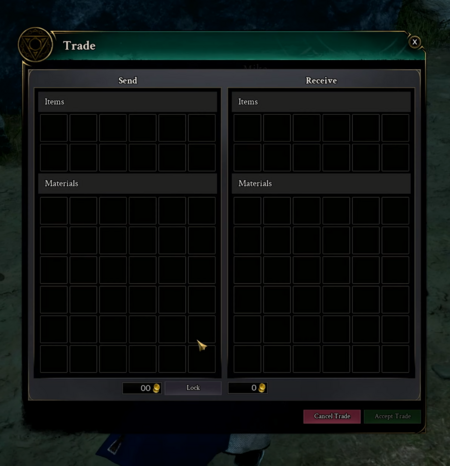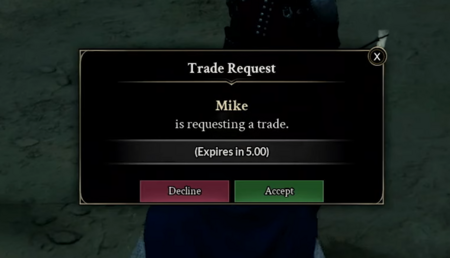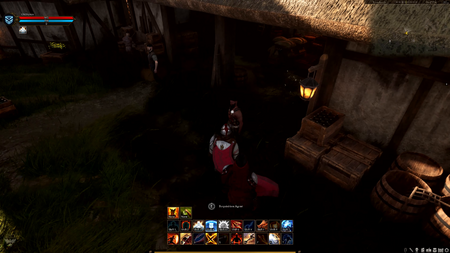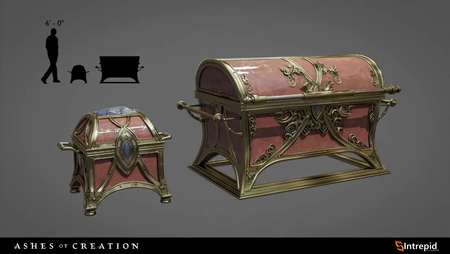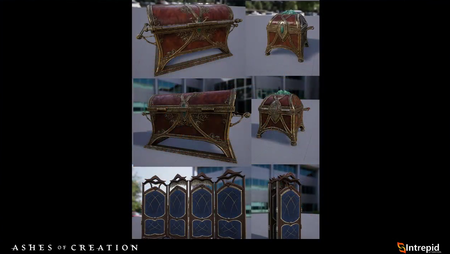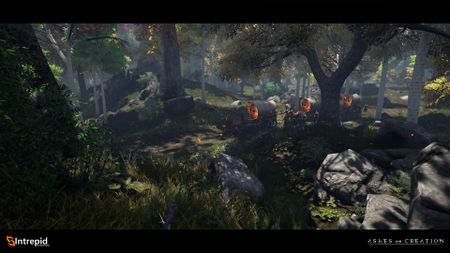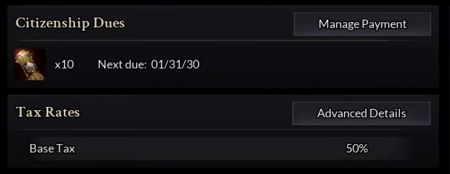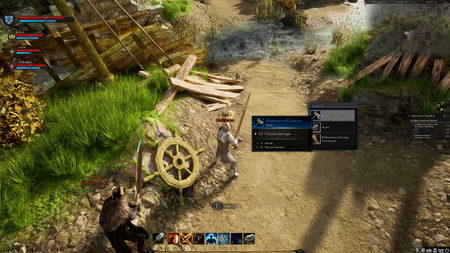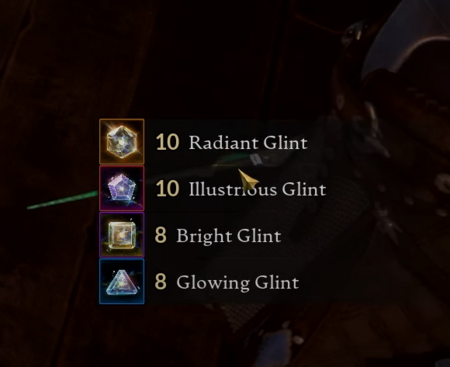Economy
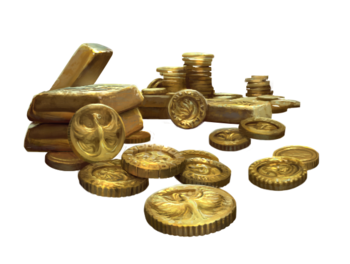
The economy is usually something that happens in the background of other games. From day one we knew that the economy was going to be something really important to us.[2] – Jeffrey Bard
The economy in Ashes of Creation is regionalized.[3][4][5]
- Gatherable resources shift locations as they’re exhausted, this will keep people moving about the world, seeking out the best resources for their crafting builds, and the best markets for their goods.[6][7][8][9][5]
- There is no central auction house or warehouse.[10][5]
- Auction houses in up to two economic metropolises (including their vassal nodes) can be linked with the linked economy superpower.[11]
- There will be item decay (material sinks), deconstruction mechanics and other gold sinks to combat inflation.[12][13]
- The developers are considering the use of adaptive price points in merchant shops based on the amount of gold being generated or sunk in the economy.[12]
- There will be player to player trading.[14][15]
- The primary method to generate gold in the economy is through glint, which is a bound currency that drops from mobs and players, and is offered as a reward for completing certain quests, events, and achievements.[16][17][18][19][20][21]
- Economic systems require scarcity. And in a game, all scarcity is artificially created in an attempt to simulate supply/demand structures or as we would call them points of player friction. You may progress within your processing profession by being a member of a guild or family of a person who owns a freehold and has setup the infrastructure necessary for t4-5 processing. With the intent that players will be able through effort to find a way of progressing and accessing late game processing. If that is not the case through testing then we will adjust the designs as necessary in order to achieve the systems.[22]
Economic regions

We want our players to have a reason to explore the wilderness, to travel with purpose, and much of that will be driven by our resource system. Transporting these goods might just be more difficult than gathering them. Our regional market system allows players to participate in creating pocket economies that will reinforce the stability of goods in particular regions. Players will be able to move resources and set up shop in other areas to take advantage of the varied markets. With resources spawning dynamically, certain regions will naturally become important trading hubs for the transportation of goods throughout the world.[23]
Economic regions are static areas defined by geographic points of interest.[3][4][5]
- Castle regions are larger and encompass multiple economic regions.[3]
- Nodes are the glue that hold castle and economic regions together in potential synergy or chaos.[24]
- Castle regions, Economic regions, and Node ZOI (Zones of Influence) can overlap.[25]
The whole map would be under the influence of 1 of 5 castle regions. However, castle regions aren't the only TYPE of region - there are also economic regions, among other things.[4] – Sarah Flanagan
Buying and selling
Player stalls, personal shops, and auction houses enable buying from and selling to other players.[26]
- Player merchants will not be able to be placed on ships.[27]
| Player stalls | Personal shops | Auction houses | |
|---|---|---|---|
| Cost |
| ||
| Location |
|
|
|
| Player presence | N/A | ||
| Storage |
| ||
| Advertising |
|
|
|
| PvP |
|
N/A |
Player stalls
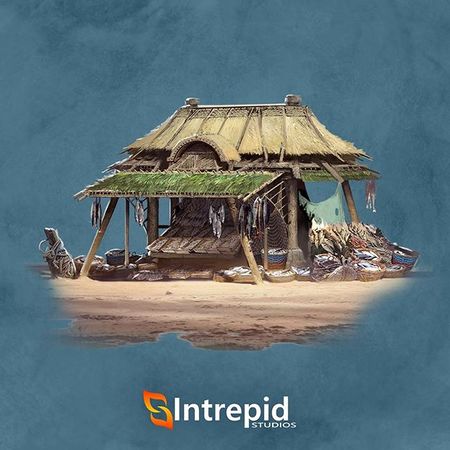
If there were ever a cornerstone serving as the bedrock of Niküan trade, then this modest stall would be it. Stacked from floor to thatched roof with all manner of catch, it is prepped for a full day of commerce and trade. Here, haggling is not merely a suggestion, but a requirement.[43]
Player stalls (also called Kiosks and rental stalls) are rentable locations near the unique building in an Economic node[33], in Marketplaces (the constructible building available for placement by mayors of any Town (stage 4) node or higher), or as business buildings on freehold plots.[45][34]
- All nodes do have the ability to spawn player stalls. If you're not an economic node and you don't have a market- that's essentially your unique building- then you can construct essentially what is I guess would be called a... marketplace; and that marketplace will then come with certain services and it will come with a certain number of stalls. The economic node as I recall has the ability to construct an auction house and the auction house serves through the economic means the ability to list and sell items and that comes with additional stalls as well for the players.[34] – Steven Sharif
Renting a player stall enables players to sell items as well as provide repair and enchanting services, even when they are not online.[28]
- Player stalls are rentable by node citizens.[29]
- Player stalls may be utilized for a period of time based on the price paid to rent the stall.[28]
- Player stalls are linked to a player's warehouse.[37]
- Player stalls do not require the attendance of the character or for that character to be online.[29]
- Players are able to input required items for repair and also purchase required materials for that repair.[46]
- Player stalls may still operate during node siege declaration. This is subject to testing.[47]
- Players are not able to be attacked or robbed while occupying their player stall inside the limits of a node.[31]
- Bulletin boards that list the items available in player stalls can be accessed from anywhere in the region.[39]
- These give the location of the stall so players can travel there and purchase the items.[39]
- Stall sales are also listed in auction houses.[26]
- This may no longer be accurate.[30]
Personal shops
Certificates to place Personal shops (player-owned shops) may be purchased by citizens and non-citizens from Economic nodes.[30][31][32]
- These certificates allow the placement of a personal shop near the unique building in an economic node or on a freehold.[30][31][32]
- Once the economic node has reached metropolis stage, personal shops may be placed anywhere in the world.[30][32]
- When a character creates a personal shop, a billboard pops up above them with a custom advertisement message for items or services available on that character's person. Purchasers can interact directly with the character to purchase these items or services.[36]
A player shop is where you have a certificate to essentially create a shop with your character and a little billboard will pop up above you as you sit down for that shop and advertise a custom message that you want say that has to sell things and/or services that are on your person. So players can then come up to you and they can interact with you. So you reside yourself to that shop.[36] – Steven Sharif
Auction house
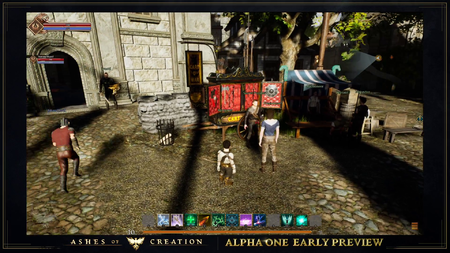
If a Node is the Vassal Node of an Economic Node, an Auctioneer NPC appears in that Vassal Node. The Auctioneer allows players to list non-resource/processed materials in the Parent Node’s Auction House, but players cannot bid on items from this Auctioneer. These resources and processed materials must be stored within an Economic Node in order to be listed in that Node’s Auction House. In order to bid, they must still travel to the Auction House in the Parent Node.[35]
Auction houses enable players to list items at specific nodes.[10][5]
- Previously this was stated to be at the economic node in which the auction house is located. The new quote may not necessarily contradict this statement.[33]
- Auction houses allow items and resources to be listed for sale at a specific node location.[10] – Steven Sharif
- A listing fee will be charged to list items in the auction house.[33]
- Vassal nodes of the auction house node will be able to view items that are listed on that auction house, regardless of node type of the vassal node.[33]
- Items listed are also visible in community boards (bulletin boards).[30]
- Integrated auction houses allow players to purchase items directly from remote auction houses.[30]
- Purchases of materials and gatherables will be automatically deposited within the listing node's local warehouse. Players will need to travel to that warehouse to retrieve them. Players wishing to move these items elsewhere will need to utilize the caravan system or other type of transportation.[38][33]
- Purchases of anything other than materials and gatherables will be mailed to the purchaser.[38]
- There may be a taxation difference between auction houses versus other player businesses.[33]
- On a regular cadence, a number of a node's freehold parcels become available to be bid for at auction.[50]
- Data relating to auction houses, such as price history, volumes, average prices, may be available to players via a mayor-constructed service building in their node.[51]
- That's probably how it's going to be surfaced... Your your mayor is going to have to build it for you.[51] – Jeffrey Bard
Bulletin boards
Bulletin boards are available within nodes[53] and player taverns.[54]
- A market UI lists the current items available for sale in the node and in the same economic region.[55][39]
- This includes items for sale in player stalls and auction houses.[30]
- Players can't purchase directly from the market UI. Instead it gives the location of player stalls where the items may be purchased.[56]
- Encourage localized grouping.[54]
- Enable posting of jobs.[53]
- Quest sponsorship.[57]
Merchant NPCs
Merchant NPCs (also called Vendors) are present from the first stage of node development (Expedition).[59]
- Merchant NPCs are identified by a golden shimmer on their nameplates.[60]
- Merchant NPCs will in general be able to buy items from players.[61]
Currencies
Currency may refer to:
- Gold is the general in-game currency in Ashes of Creation.[62][20][21]
- Bound currencies are progression-based currencies that cannot be traded.[62][63][20]
- Embers is a virtual currency that can be used to purchase cosmetic items within Ashes of Creation.[64]
- Intrepid Bucks are earned through the Referral program.[65]
Gold

Money will play a big part in the in-game. However, with that being said, there are organizational specific currencies that can't be traded. So there is like a general gold that will be very important end-game, but then there's also your progression within certain religions, societies, or nodes will also have... there will be progression-based currencies as well.[20] – Steven Sharif
Gold is the general in-game currency in Ashes of Creation.[62][20][21]
- Gold, silver, and copper coins are present in the game.[66]
- There is no cap on how much gold a player can hold.[67]
- Monsters don't drop gold, they instead drop glint. Glint is the primary method for players to generate gold.[16][17][18][19][20][21]
- Game currency does not have weight, but glint occupies space within the spatial inventory system and must be transported via crates when in large quantities.[68][69]
- Players do not lose gold upon death, no matter their corruption level, but glint will drop as stolen glint on a character's death, based on applicable death penalties.[18][70][71][72][20][73]
Bound currencies
Bound currencies are specific progression-based currencies that cannot be traded. Bound currencies are utilized by various systems.[62][63][20]
- There are bound currencies that exist within the game; and then there is the general currencies that's usually achieved through certificates and the ability to trade those certificates in to get gold that we've talked about in the past. But some of those bound currencies are like favor: these are points that you achieve doing some divine questlines, participating in divine story-arcs; or honor, which is like PvP-oriented unique currency stuff like that.[62] – Steven Sharif
- Religions.[20]
- Social organizations.[20]
- Tavern games (potentially).[74]
- Glint is a bound currency that drops from mobs and players, and is offered as a reward for completing certain quests, events, and achievements.[16][17][18][19][20][21]
- Node types have specific bound currencies that are earned through personal progression within the node.[62][63][75][20]
- Honor at military nodes for completing PvP-related activities.[62][75]
- Favor at divine nodes for completing divine questlines and story arcs.[62][75]
- A bound currency that's used to purchase a number of different types of vendorable items that exist within nodes. It is not player-to-player currency. It is not intended to be traded between players, but instead it interacts with these unique vendors that supply a large segment of necessary components for a number of different things: whether it be crafting, enchantments, a lot of different things that exist within the node. This is the reason why you would want to acquire that currency so you have access to those types of items.[76] – Steven Sharif
- Node currencies stay bound to the player, even if their node is destroyed or they drop citizenship. They will be able to use their node currency once they are a citizen of a new node (of the same type).[77][62]
- Node currency stays with the player even if their node is destroyed or they drop citizenship. This is something that you have available to you and you carry forward to your next location. But you may only spend your node currency at nodes that you're a citizen of.[77] – Steven Sharif
- Players must have enough node reputation in order to purchase certain items with node currency.[77]
- You have to have enough node rep to be able to buy certain tiers of things from the node with your node currency. Even though the currency is generic, you still need the rep with the node to unlock better purchases.[77] – John Collins
Player to player trading
There is player-to-player trading in Ashes of Creation.[78][79][14][15]
- Q: Will Ashes of Creation have player-to-player trading? Will there be anything stopping me from gifting a friend that's fresh to the game a bunch of in-game money to help them get on their feet quickly?
- A: There won't be anything to stop you from doing that.[14] – Steven Sharif
- Player to player trading, interacting with vendors or NPCs, and the ability to access storage is disabled for corrupted players.[80][81][82]
- The nature of player to player trading already introduces that in an open economy game... that is why we have measures to attempt and heat flag suspicious transactions, active gms and other honeypot systems/agents that will be active in discovering those types of cheaters.[79] – Steven Sharif
Escrow system
- An escrow system is planned to prevent griefing in the crafting system.[87]
- We're going to have a UI... you're gonna put the resources in or they're gonna put the resources in. It'll be like an escrow system and then once [the job] is complete you'll get the item they'll get the money.[87]
Caravan insurance
Caravan insurance will not be an in-game system in Ashes of Creation.[88] Previously it was stated that insurance was able to be purchased from a caravansary prior to the launch of a caravan.[89][90]
- There's nothing to say that that can't be player organized. If some particular guild wanted to go and create a caravan mercenary corp that helped aid in the defense and transit of caravans, they could employ some type of insurance system.[88] – Steven Sharif
Mailing items
- Raw gatherables and materials are not able to be mailed by players.[91][92][93]
- Purchases of anything other than materials and gatherables from integrated auction houses will be mailed to the purchaser.[38]
- Social messages sent via mail will be received instantly.[91]
- It hasn't been decided whether crafted items such as gear will be able to be sent via mail.[91]
- From an item standpoint obviously we can't allow mailing to include any type of resource material or raw gatherable because those are central to the gameplay and transiting through the caravan system and economic regions. But it may be possible to send completed crafted items like gear, equipment, stuff like that. But it's something we're still discussing.[91] – Steven Sharif
Gear binding
There may be some gear binding (BoE or BoP) but it will be an exception rather than the rule, as this doesn't facilitate the objectives for the economy.[94]
- Very little gear will be account bound or soulbound in Ashes of Creation.[95][96]
- The game economy is based around crafting and degradation of items.[95]
- Gear is obtained via crafting, gathering and processing along with raid and dungeon bosses.[96]
A lot of what we experienced in games that usually come before us is that many things are account bound and they're soulbound to your character... Instead very little here is character bound. Very very little. The vast majority of gear- yes you will get quest related gear as rewards- but it won't be let's say one set in one dungeon and you must run the dungeon over and over. Instead we want to really emphasize the reliance on the economy and crafters and gatherers and processors to support a majority of the gear structure in-game, combined with that of world raid bosses and dungeon bosses; not a repetitive quest line through a single dungeon.[96] – Steven Sharif
Theft
There will not be a theft (stealing/pickpocketing) mechanic in Ashes of Creation in regards to living players.[97][98]
- There may be quest related actions that involve some form of stealing, but not of actual items from a player's inventory, where the player is identified as the quest's target via a title or some other means.[97][99]
That emergent gameplay is obviously the objective behind how can we accommodate a non-static quest-line; and the way you do that is you can apply a flag to a title and whoever holds that title becomes the target of that quest segment. And this can change too because that title can change- different people might rise up in the ranks of different societies and organizations.[99] – Steven Sharif
- Players are not able to be robbed while occupying their player stall inside the limits of a node.[31]
There is not a theft mechanic for you to walk up to a player that's alive and steal something.[98] – Steven Sharif
Storage
Storage points exist at warehouses within nodes and in chests (storage containers) that can be placed in freeholds and static in-node housing.[100][101][102]
- Sheds are present on empty freehold plots to provide basic storage for materials needed to construct freehold buildings.[103]
Warehouses
Warehouses are default service buildings that come pre-built with nodes. Their function is to provide storage points within nodes.[104][105][101][106][40][41]
- Cargo for shipment by caravan is stored at the caravansary not in a player's inventory. Stored cargo is visible via the warehouse UI.[107][108]
- Completed items can be accessed by players in warehouses at any node regardless of citizenship or housing ownership.[109][110][111]
- Gatherables and materials may only be accessed in the warehouse location they were deposited in.[112]
- Requisition agents for mayoral buy orders are located at node warehouses.[58]
- Players are prohibited from moving gatherables, materials, and commodities in sealed crates out of depositories within a node following a siege declaration against that node.[112][36][113][41]
- A portion of all gatherables and materials that were stored in successfully sieged nodes become lootable.[114][115][116][40][41][42]
- Whole items (crafted items) are not vulnerable to loss during node sieges.[37]
- Corrupt players are not able to utilize storage systems.[80][81][82]
- Player stalls are linked to that player's warehouse.[37]
- Personal caravans may be launched from any point of storage (including warehouses).[117]
Player housing storage
Chests are a type of furniture that provides localized storage within a specific house.[119][120][121]
- Players must obtain and place storage containers in their player-owned housing.[120]
- Different grades of storage containers have different inventory capacities.[120]
- There are restrictions on the grades of storage containers available in different types of houses.[120]
- Access permissions can be set to allow others to access a player's personal storage devices.[119][122][123][124]
- Personal storage chests may be set to permit access by family or guild members.[123][125]
- Transfer of resources and materials to alts will only be possible via player housing storage, as this is local to the specific house.[119]
- Players are prohibited from moving goods out of depositories within a node following a siege declaration against that node.[41]
- Gatherables and crafting materials that were stored in in-node housing and apartment storage chests become lootable upon a successful siege against the parent node. These do not become lootable if the node survives the siege- even if the housing buildings are destroyed or damaged during the siege.[40]
- Corrupt players are not able to utilize storage systems.[80][81][82]
- Personal caravans may be launched from any point of storage (including chests).[117]
Banking
Nodes advance to the first stage quickly. This enables NPC services such as vending or banking items.[126]
- Banking between characters will likely be restricted to furniture and completed items.[124]
- A warehouse ability may enable a player to transfer non-material goods between alternate characters. This excludes resources, materials or anything that relies on the caravan system.[106]
Caravans
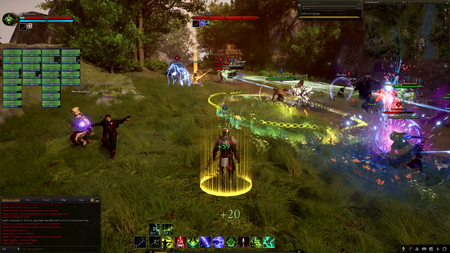
The Caravan System is a major aspect of the economy in Ashes of Creation. While the rewards can be great for moving massive amounts of Commodities and other materials across the world of Verra, players can choose to be Caravan attackers or defenders, making these hotspots for PvP battles.[128]
Caravans are vehicles that facilitate the transfer of cargo across Verra.[130][16][131][132][89][90][133][134][23]
- Caravans are the induction of emergent gameplay, which means you cannot predict the situation you're going to be in when you use a caravan. That's part of the risk: The risk is the unknown. If you could predict it then your ability to mitigate that risk would unfortunately remove that dynamic- that ratio of risk versus reward.[135] – Steven Sharif
- Personal caravans are used to transport cargo for one or more players.[89][90][133]
- Mayoral caravans are used by Mayors to transfer cargo between nodes with established trade agreements or alliances.[131][132]
- Caravans are initiated from and arrive at caravansary node buildings within Village (stage 3) nodes and above.[136][89][137][138]
- Caravans create an objective-based PvP event in the open-world that players can choose to attack, defend, or opt-out of.[139][140][141][142]
- PvE caravan events can cause roadways to be blocked off or hostile mobs to spawn to attack the caravan.[143][144]
- It is possible to launch decoy caravans and merchant ships, but there are visual hints of what is contained in a caravan.[145][146][147] Decoy crates may be available via social organization progression.[145]
Caravan types

There are different types of Caravans in Ashes of Creation.[132][149]
- Personal caravans.[150][136][151][152][149]
- Mayoral caravans.[153][131][132]
- System driven caravans.[131][132][149]
Raft caravans
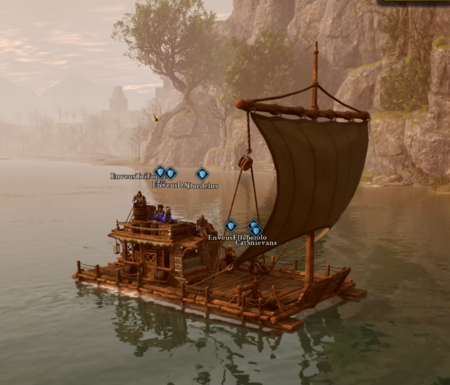
Caravans are capable of transitioning from land to raft caravans. So if you start out as a land-based Caravan and you move to the coast and you want to move into the water there's gonna be a little transition period there; it's gonna be a little construction site: You're not gonna have to do anything it's just gonna be a timer right so that you can't quickly move between land and water. It's gonna be probably in the matter of a minute to two minutes. There's a little bit of vulnerability in that regard.[152] – Steven Sharif
Raft caravans (also referred to as Naval caravans) allow the transportation of cargo over the water.[155][156][89][157]
- Unlike merchant ships, raft caravans are capable of transitioning to and from land caravans at the point of intersection of land and water.[156][89][158][152][157]
- Raft caravans may only be used in rivers.[159]
- Currently the stats of the raft are informed by the components of the caravan. This may be changed based on testing.[160][152]
- By default, raft caravans have a racial appearance. Players will be able to apply caravan skins to change this appearance.[152]
Artisan classes
| Gathering professions | Processing professions | Crafting professions |
|---|---|---|
Artisan classes (also referred to as Artisan branches) allow a player to specialize in one or more of the three artisan skill trees: Gathering, Processing, and Crafting.[161]
- We want players to interact with each other. We want the professions to make stuff for the other professions that are useful. I am influenced quite a bit by the Star Wars Galaxies style crafting; and just having people in your network that could supply the metal that you need to make your armor, and the flowers that you need to make your potions, and maybe the potions that you need to make your enchantments. That to me was really interesting; and part of the economic gameplay of being a good crafter, being a good gatherer, is having that system; and it really plays into the economic field of a particular server. You can come in and be like, I want to be the the potion mogul here; and having good sources and having a guild that supports you is just really interesting. And without narrowing down what you have access to yourself, it takes away from the ability to achieve that.[162] – Kory Rice
Within each of the three artisan classes lies different professions.[163]
- Characters within a single account (Alts) may have different professions.[164][165]
- Q: How do you feel about players creating alts that allow them to cover every profession?
- A: I think that's fine and I think that when we design the game, we design with that in mind as well; and that's why we have certain restrictions on the number of Grandmaster professions that one particular character can do.[164] – Steven Sharif
- Artisan progression in each profession is per-character.[168][167][169][165]
- Progression within each profession requires the completion of certification quests.[170]
- There are limits to the number of professions a character can achieve certain tiers of progression to.[171]
- Artisan progression does not directly relate to progression in a character's adventuring class, but there are requirements that take into account dangers, locations, toolsets, and surveying options that are level dependent.[172][173][174]
- Characters gain XP as they progress their artisan professions, but it should be expected that some artisans will have significantly higher artisan level than their adventuring level.[175][176][172]
- Choice of profession does not affect a player's stats.[177]
- Artisan classes and their professions are not affected by a character's religion, or class.[178][179]
- Race likely won't affect the artisan system.[178][179] Certain influences may instead be housed in a background selection that isn't intrinsically tied to race.[178]
- When it comes to balancing a system that's something that we do during testing phases. When it comes to architecting the system itself and identifying the areas in which certain certain professions excel, where they interact with ancillary systems, their interconnectivity across the artisanship system as a whole, the important part there is to identify how that the interconnectivity lives with the other professions in the artisanship system. And what type of reliance you have on particular professions to complete the path of crafting or introduction of new items into the economy.[167] – Steven Sharif
- A work order system is planned that will help players find artisans in nodes.[180]
Gathering professions
Processing professions
Crafting professions
- Arcane Engineering
- Armor smithing
- Carpentry
- Jewel cutting
- Leatherworking
- Scribing
- Tailoring
- Weapon smithing
Artisan supply chain
Artisans within Ashes of Creation must choose a path in their artisan skill tree. This inter-dependency establishes a supply chain from raw materials to finished product.[181][182] Each stage of the chain may require caravans to transport goods from one artisan to another.[183]
- Obtaining raw materials:[184]
- Refining the raw materials with the Processing profession.[182]
- Crafting the finished product using its crafting recipe.[182]
As a crafter you're going to want to know where certain recipes can be fulfilled; which nodes have the capability of creating what you've processed material that you've gathered for; and then you're going to want to plan out your route to either transit the goods there or make sure that you're situated in the area so that you can go out collect and build in that area as well. So there's a lot of planning that's going to be necessary.[187] – Steven Sharif
Taxes
Node taxes
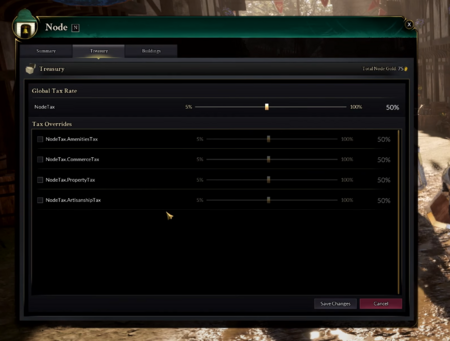
As the node levels up, you're gonna get access to deeper controls on the taxes, so that you as a Mayor can incentivize players to come to your node to do certain things. If you're a node that loves smithing, you're probably going to want to lower your taxes on artisanship to incentivize players to be here. But then you might want to drive up taxes on other avenues that players aren't necessarily coming to your node for, but are using out of convenience.[188] – Chris Justo
Mayors are able to set a generalized node tax rate as well as overrides for different activities within their node. Mayors gain additional taxation controls as their node advances.[188][189]
- Amenities tax override.[188]
- Artisanship tax override.[188]
- Commerce tax override.[188]
- This may include taxes that apply to tavern games.[190][191]
- Property tax override.[188]
- Freehold property taxes scale according to the number of freehold building permits issued for that freehold.[192][193][194]
- Citizenship dues and property taxes scale based on the stage of the node when a player became a citizen.[104][195][196][197][198]
- The goal is to exert financial pressure on node populations by making taxes increasingly expensive as nodes advance, rather than putting in place hard population caps.[196][197]
- Node tax rates will be visible on the world map by hovering over a node location.[199]
- Tax revenue only goes toward funding node development. This cannot be withdrawn by the mayor or any other player.[200][194]
Regent nodes take a cut of taxes from various activities that occur within their vassal node structure.[200][201]
- This tax doesn't necessarily impact the individual citizen, because citizen's tax levels are determined by their node, but the node's finances are affected by the taxation levied by its parent nodes.[201]
Housing taxes
When a node reaches stage 3 (Village) and a player run government has formed, all player housing will pay taxes.[202]
- A player's tax charge will be determined by the number of structures built on their plot.[193][194]
- Freehold taxes are calculated based on the number of permits issued for buildings on a freehold.[203][204][192][193][194]
- Buildings that require permits will have additional upkeep costs.[203]
- Maintaining businesses requires licensing and payments to the node your Freehold is associated with. This permitting system allows for a certain number of buildings to be constructed on a Freehold. Permits can be obtained from the same node the Freehold was certified from, and buildings that require permits will have an additional upkeep cost.[203]
- Housing foreclosures result from failing to pay property taxes or other fees.[203]
Housing foreclosures
Housing foreclosures result from failing to pay property taxes or other fees.[205][203]
- Non-payment of taxes will put the housing into a default status. The player will have a period of time to settle the debt before the housing is foreclosed.[205]
- The developers are considering allowing pre-payment of housing taxes and/or allowing auto deduction of tax from a designated location, such as their personal inventory or warehouse.[206]
- Materials and resources (such as livestock) that were stored on foreclosed freeholds will be included in the auction for the deed to that freehold. Stored and placed props, such as furniture will be returned to the previous owner.[203]
- If you don’t pay taxes and other fines, your Freehold property will be foreclosed. When a Freehold is foreclosed on, stored and placed props like furniture are returned to the previous owner. Materials that were stored on a Freehold will be included in the auction for the Deed to that Freehold.[203]
- Non-payment of the game subscription will also result in loss of player housing.[207]
Castle taxes
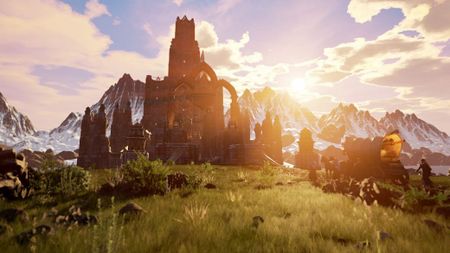
Castles have direct power over the Nodes that belong to it, but also have soft power across the entire region it belongs to. All Nodes belonging to that region pay fealty to the Castle in the form of taxes paid directly to the Castle. The Monarch sets the rate, and can use those proceeds to upgrade defenses, maintain the Castle’s direct Nodes, or provide buffs and benefits to the citizens of that region, as the magnanimous ruler that you are.[208]
Guild castles impose a tax on all revenue for the nodes within its region.[209][210]
- The monarch sets the tax rate, and can use those proceeds to upgrade defenses, maintain the castle's direct nodes, or provide buffs and benefits to the citizens of that region.[208]
- Castle taxes are carried via NPC generated caravans from the nodes that fall under the castle's purview to one of the castle nodes at the end of each week leading up to a castle siege.[211]
- In addition to taxes, Castles also influence crop yields, resources and events within its region.[212]
- Part of the tax and resources gathered are applied to the castle for improvements.[209][213][214]
- The remainder of tax income can be used by the guild for whatever they want.[209][215]
- When castles change hands (following a siege), some taxes stay with the castle and some stay with the guild.[216]
- Castles have the ability to allocate taxes collected from nodes under them toward certain benefits that go back to the node. Or they can be more selfishly governed that treasury more towards the guild that owns it and that obviously is going to have some political implications, because it could- if you're not using it for the benefit of the people in the region they might rise up and help take you out from that that position of owning that castle.[209] – Steven Sharif
Item sinks
It's important for a healthy economy to have item sinks, so that anything that can be crafted can also be destroyed:[13]
- Over-enchanting carries the risk of destroying that item[184], rendering it useless for use temporarily.[217]
- Players gain craftable items and recipes from deconstructing (salvaging) completed items.[184]
- A portion of resources and materials are lost when caravans or nodes are destroyed.[218]
- Corrupted players who die can lose gear.[219]
- Item durability (item decay) does not destroy items, but it acts as a materials sink.[219][220][221] Zero percent durability will unequip an item, increasing its repair costs.[222]
An important aspect of a healthy economy is having some item sinks available... There are three kinds of item sinks: You can gain craftable items from deconstructing completed items; You can have decay... and if you want to over-enchant that item there will be a potential to destroy it as well. It's important for an economy to experience those types of emphasis on what can be crafted as well as seeing those items that are crafted be destroyed as well..[221]
The concept there is this is part of the engine that is supply and demand. So the server is constantly generating these materials on tick as they propagate throughout the world and get repopulated, players are going out there and collecting these things. We want to make sure that there is a driving force and factor behind what crafters and gatherers are out there doing: There's constantly going to be a demand for them to supply these things. Whether that death is from PvP or from PvE these are going to be necessities for players to constantly provide.[220] – Steven Sharif
Item durability

The decay system is not going to be some worthless "Oh I'm just going to throw some gold into this and it's a simple gold sink". It's actually going to require some base materials in order to repair decayed items; and decay occurs from death and also the destruction and disable system. For the weapons over the over-enchanting will require those materials as well. So creating that dependency I think is healthy for the crafting economy.[223] – Steven Sharif
There is item durability (item decay) in Ashes of Creation.[221]
- Materials are required in order to restore the performance of decayed items.[225][220][223][46][226]
- Item decay does not destroy items, but it acts as an materials sink.[219][220][221]
- If you allow it to get to certain stages, or to get to a destructed stage then it requires a lot of material components in order to return back to its former glory.[225] – Steven Sharif
- Over enchanting an item comes with the risk of durability loss if a safety margin is exceeded.[223][227][228]
- There is durability in the game... It's not going to be a trivial durability. There is a potential to destroy gear (weapons and armor), but there is also an ability to reforge that destroyed gear using a portion of the materials necessary as well as finding an item creator who can reforge it.[221] – Steven Sharif
Item deconstruction
Players gain craftable items and recipes from deconstructing (salvaging, dismantling, disenchanting) completed items.[184]
- There's salvaging where you can deconstruct an item to get components only capable of retrieving from salvaging an item that can be used in crafting other types of items.[13] – Steven Sharif
- Specific and necessary crafting materials for higher tier items can only be obtained through the deconstruction of lower-tier items. This is designed to keep lower tier crafted gear relevant through progression and across expansions.[229][230][13]
- Specific crafting components yielded by gear deconstruction, and some of these components can be only be obtained from gear of certain enchantment levels and type of equipment. These components are needed for certain recipes for gear and other ancillary crafting professions. But the itemization team is still ironing out some of these flows.[229] – Steven Sharif
- Item deconstruction will not be a meaningful way of circumventing restrictions on transit of resources and materials.[231]
Power creep
The developers intend to limit power creep via item sinks, the lack of gear binding, and the absence of pay-to-win or pay-to-convenience in Ashes of Creation.[232]
Security systems
Security systems will be in place to combat cheating, exploiting, botting, gold selling/real money transactions (RMT), item duplication and other things that affect the economy starting from Alpha-0.[233][234][79][83][84][85][86]
- A broad spectrum of approaches are going to be utilized in order to try to protect the integrity of the game once it launches. Testing of these systems will begin leading up towards Alpha-2.[234]
- Security is always at the top of any concern when you have a closed system like an MMO is... We've seen a lot of MMO is launch without security in place and the economy gets ruined as a result thereafter. And every band-aid that's slapped on top of that wound is just making things worse. And so part of why you take the time in order to ensure that things are done correctly is also the security component of things; and that's where testing with a live audience is a bit different also than testing with a Q&A audience as well, because you're going to get those bad actors- and we call them bad actors because ultimately they're attempting to destroy the fun for others... So what we've done is we've hired some security experts who've worked on massive other MMOs like World of Warcraft and other games, and they bring with them lot of experience; and we're going to be testing that in leading up towards Alpha-2. It's a very important part of Alpha-2. It's not something that we really addressed with Alpha-1 because again, that was a much more barebones functional testing experience. We did see some issues during Alpha-1 and we made it important for Alpha-2 to test those systems. We have a broad spectrum of approaches that we're going to be utilizing in order to try to protect the integrity of the game once it launches.[234] – Steven Sharif
- These systems collect user data and flag abnormal activities for investigation. This combined with player reporting functions generates a live "heat map" that draws attention to unusual behavior.[233][79][83][86]
- We do have already built into the game on the outset is essentially behavioral metrics. So in the game, as a player does normal things and they acquire normal gold, that's all good and well, but if there starts to be item IDs that appear on the player account that are out of the norm, like either a large amount of gold, or significant legendary items, what it does in the back-end it flags the account for view so that we can take a look at where did this item come from. Is it coming from a known gold seller or a flagged bot, or whatever; and then we investigate. So we're going to be pretty hard on the ability for players to subvert the natural economy systems by RMT or botting.[83] – Steven Sharif
- Botters, cheaters, gold sellers, and RMTers, will face severe penalties from the active GM/community team.[233][235][236][86]
- It's important to note that there is a sanctity that must be protected within the game from RMTing; and let me just go into a little diatribe about this: But in games that I've played where the company or the publisher does not enforce rules, it becomes the standard that you buy gold if you want to be competitive. If you want to compete at the top tier levels in certain games, and everyone's buying gold, you almost either have to buy the gold or you're just not going to be able to compete with those people and that's a really shitty feeling to have. Excuse my French, I apologize. That is sucky; and in order for that not to be the case it is the responsibility of the publisher or the developers both to make sure that we have stringent practices from a CS- from a customer customer service perspective- to enforce our rules and to make sure that players are aware if they partake in this there is a huge risk in doing so. It's not going to be a slap on the hand. It's not going to be a "we told you once, we told you twice, we told you three, four, five six times okay. We're just taking some gold away", that thing. We have got to ensure that it is feared to do those things because that ashes has active GMS, it has active customer service, it has an active community team.[236] – Steven Sharif
Game masters
Game masters (GMs) will be present and active on Ashes of Creation servers.[79][237][236][238]
- On the customer service side, we do plan to have in game GMs. We do plan to service people in the best way possible. And we will grow our service team as much as we need as our player base grows.[237] – Margaret Krohn
- The direction that I'm taking Intrepid as a company in is that a significant portion of the revenue created by the game goes into not only creating additional content and updates for the game but also goes into I think caretaking, as I like to call it; and that caretaking is multiple things: It's having active and present GM's on servers. It's having a an interacting community team that is always present and on-call for participating in forum discussions and streams and updates.[238] – Steven Sharif
- There will be a standard escalation system, where different actions are taken based on the seriousness of each infraction. Actions could range anywhere from being stripped (of the illegitimate items or currency) to being banned for a period of time, or being permanently banned.[238]
- Following a standard approach to an escalation system where certain infractions are immediate and automatic bans and some infractions provide a path forward where action is taken that might ban the account or strip the account or provide some chat bans or the ability to play over a week or so... If you buy gold and depending on the seriousness of the infraction you could go anywhere from being stripped and to being banned for a period of time to being permanently banned.[238] – Steven Sharif
- Botters, cheaters, gold sellers, and RMTers, will face harsh penalties from the GM and community teams.[236][86]
- When a player takes their play experience to the point of harassing another player, and doing so on a repetitive basis, in order to diminish their play experience, it is a ticketable offense. If you are following around a streamer or you're following around a player and your intent is to keep them from playing the game or to force them to quit, that is a dirty player mindset. It's a bad player mindset. It's a griefer's mindset. It's not something that's desired in the ecosphere in the community of Ashes of Creation. And as a result, it is a serviceable customer service situation. That is where warnings are given and actions can be taken against the account holder of an individual whose sole purpose is to disrupt and affect negatively the gameplay experience of the game.[237] – Steven Sharif
- Players that work outside of the game design to grief or harass other players are actionable by customer services.[239]
- I believe that so far in development we have demonstrated the level of customer service and community engagement that will be on display after our live launch. You are right however in saying that many of these problems that can arise on the fringe of certain systems will require an active GM support team available to address problems that the user base encounters[241]
- The volunteer moderator program will continue (post-launch).[242]
Two-factor authentication
Token-based two-factor authentication (2FA) was expected to be in place for Alpha-1.[243]
World manager
The World manager is an algorithm in Ashes of Creation that controls dynamic world elements. It acts as both a throttle and an incentive system for various activities to ensure certain parameters are within acceptable thresholds.[244]
- A world manager is a technical term to define a server process that lives alongside the game server; and when the game server needs to do things- communicating with other game servers within that grid- it tells that manager and that manager sends it down to the appropriate server.[245] – Steven Sharif
- Prices of glint.[246]
- A heatmap of experience being gained to apply to node advancement.[246]
- The territory expansion algorithm takes into account the nearest coast, neighboring nodes, and the heatmap of players in surrounding areas over the last weeks or month.[247]
- Due to the way the progression algorithm calculates territorial (ZOI) expansion during node advancement, there is a small possibility that two nodes of the same stage end up being close to each other.[248]
- Transit of resources and goods between regions to drive quest rewards for nodes.[246]
- For example if you know iron is being used as a raw resource for a specific crafting path that might drive up the price of mithril or silver; and that will incentivize the market to course correct a little bit. The idea is to provide soft incentives that help to alleviate the demand and also to prop up the supply that might not be present from the economic systems.[246] – Steven Sharif
Loot tables
- Mobs drop glint, Items, and crafting materials in preference to gold.[20][21]
- Glint is not bound to a specific region and can be also dropped by players on death as stolen glint, based on applicable death penalties.[68][18][71][72][20][73]
- The rarity of glint increases with the mob's level.[250]
- Loot tables are disabled for player controlled monsters.[251]
- There is a small RNG chance of looting rare and legendary items or crafting materials from mobs based on the level, status and type of mob. This also applies to harvesting resources with a gathering profession.[252]
- Experience debt decreases the drop rate percentages from monsters.[253]
- Loot (loot tables) from world bosses or dungeon bosses has a small RNG chance of dropping gear (completed items).[254][255]
- There is a much higher chance that materials and unique recipes are dropped that can be used to craft items of equitable value.[254][256][257]
- Legendary equipment is only dropped by Legendary world bosses.[258]
- Loot tables will likely not be affected by weather conditions.[260] This was previously listed as a possible effect.[261]
- There won't be specific loot drops for artisans.[262] Previously it was stated that master gatherers may have the ability to "spoil" a boss' loot.[263]
- Q: Can only one gathering artisan harvest resources from a single boss, or can multiple different artisans harvest different parts from a boss for different resources? For example, a lumberjack gets a special wood from Tumock's tree weapon, while a herbalist gathers the flowers from that same tree.
- A: We don't have the concept of harvesting from bosses. NPCs follow a reward table format, where those reward tables are global. They're not unique to particular players. So, once the NPC is vanquished, you have access to the loot container that is its corpse; and it has a static value of either materials or items that get dropped; and whatever the party loot settings are that you might be a part of, or if you're a solo player you will be able to recover those things.[262]
Glint
Glint (previously known as Hunting certificates and Monster certificates) is a bound currency that drops from mobs and players, and is offered as a reward for completing certain quests, events, and achievements. Glint is intended to be the primary method for generating gold in the Ashes of Creation economy.[16][17][18][19][20][21]
- Glint serves a very integral role in the economy within Ashes of Creation. It is a material substance that is acquired through various means, but primarily hunting different antagonists within the world; and it is the physical form of Essence within the beasts of Verra. So when you acquire this it is bound to your character, and that is a very important component of the economic systems here because glint will be used to pay for certain services, such as taxation for buildings that you have, or citizenship dues that are necessary.[265] – Steven Sharif
- Glint is not localized to specific regions.[68][18][71][72][20][73] Previously it was stated that glint was specific to an economic region.[246][20][266][21]
- Glint occupies space within the spatial inventory system and must be transported via crates when in large quantities.[68]
- Glint can be sold directly to commodities vendors at hunting lodges within nodes to "make some quick money".[267]
- Glint may be traded with commodities vendors for player commodities. These commodities can then be transported to other nodes (via caravan or merchant ship) where they can be traded for gold.[18][246][20][266][21] The gold value is based on the demand for the commodity at the destination node (over the last seven days) as well as its distance from the originating node.[268][18]
- Glint will drop as stolen glint on a character's death, based on applicable death penalties.[18][71][72][20][73] Glint taken from caravan wreckages is also classed as stolen.[269] Stolen glint is not bound and may be redeemed for less than its original value at black market locations.[18][71]
- Glint may be used to pay housing taxes and citizen dues.[265][18][19]
- Glint can be stored within node warehouses.[20]
- Glint is not intended as crafting materials.[19]
Population based scaling
The prices that NPCs sell items for will scale based on the economic activity on a server. Prices will rise to combat inflation and fall as a population diminishes.[270]
The node system allows the developers to scale the experience needed to level a node and the attrition that affects a node based on activity.[270]
Things that NPCs buy and sell scale based on the economic activity that exists on that server... As inflation rises, prices rise and everything ends up being equal, even though there might be a couple of extra zeros. So that can go up and it can also go down so as a population leaves, things become less expensive and players don't have to do as much to earn that. On the other side of things we look at the node system and the node system is set up in this really flexible way that allows us to scale the experience needed to level a node and the attrition that delevels a node to scale based on activity too. So it's just a matter of adjusting a couple of constants and that goes up and down and the server can watch it and change those on the fly as it needs to.[270] – Jeffrey Bard
Trade agreements
Mayors can enter into trade agreements with other nodes to facilitate trade between the nodes.[131][132][271]
- There are a limited number of trade agreements that a node can have.[131]
- Mayoral caravans may only be initiated between nodes with trade agreements or alliances.[131][132]
- Trade agreements affect reputation between the nodes.[104][272]
- Mercenary guilds will be a viable way forward for different organizations. I think there will be a lot of business to be had with that; and one of the systems in our trade agreements is creating an escrow for those particular type of arrangements that we're looking into.[273] – Steven Sharif
Trade routes
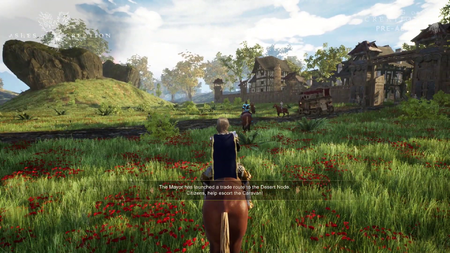
For example: this node over here might have access to cotton as a resource and when that node processes that cotton it might be some very nice type of linen that only that node, or very rarely nodes would have access to. So when you initiate a trade route, you're bringing its supplies that the mayor has requested because they're trying to build, let's say a specific type of service building, or they're trying to unlock a blueprint that they have access to now to build up their node.[274] – Steven Sharif
Trade routes in Ashes of Creation refer to.
- Roads for the transit goods via the caravan system.[275]
- You might have a mountain pass and during winter that mountain pass is always closed and so the trade routes on land change with caravans and that's something that can not only exist on a cyclical level but also dynamically based on player activity.[275]
- Economic relationships between nodes established by Mayors or node citizens.[274][132]
- Agreements are established to trade commodities that are unique to particular nodes or node types via NPC-driven caravans.[274][132]
- From a diplomatic standpoint the ability for the mayor or citizens to set up NPC routed trade routes between nodes as a trade agreement or as a diplomatic process.[274] – Steven Sharif
Stock exchanges (also called Stock markets and Share markets) enable players to buy and sell shares in Nodes, Guilds and Social organizations.[278][279][280]
- Stock exchanges were a Kickstarter stretch goal unlocked for reaching the $3 million dollar mark.[280]
- This is a planned feature for the launch of Ashes of Creation.[278]
- The value of stocks is influenced by world events and the performance of nodes, Social organizations or guilds.[281]
- Hard metrics, such as quest lines, nearby resources, citizen progression, and purchases of local real estate, will determine the value of purchasable shares.[280]
- There is no regulatory commission to restrict the purchase and sale of stocks.[281]
Real estate
Players buy the deeds for housing from the node itself, or may buy and sell properties from other players.[282][283][284][285][286]
- The developers are considering an auction-based method for listing new properties that become available for purchase when a node advances.[287] Currently freeholds may be acquired via auction.[203][288][289][290][291][292]
- Housing will have a base price that scales with the number of citizens in the node.[293]
- There is no cap on the price of player-originated housing sales.[294]
- In-node housing will be at a premium, and is expected to be hotly contested.[286]
- The more apartments that have been purchased in a node, the higher the price scales.[295]
- Player housing that is destroyed during a node siege can no longer be sold.[296]
- Freehold plots may be purchased from and sold to other players,[282][297] or can be obtained via deeds issued by a Village (stage 3) or higher node.[203][288][289][290][291][292][298][299]
- We're establishing a real estate market that players can invest in and then sell within the in-game economy, but also they are a resource that's subject to removal through the sieging system as well, so there's a bit of risk implied there but the idea is that this is something for players to strive for.[297] – Steven Sharif
- Housing ownership can default back to the node if the owner fails to pay their property taxes. A balance and penalties will be charged to the new purchaser of the home in the manner of a "foreclosure process".[293]
- Players will not be able to exceed their allotment of housing in the game.[303]
- Rental and leasing concepts are under consideration.[303]
Visuals
2022-05-28 2018-04-01
See also
References
- ↑ 1.0 1.1 Ashes of Creation Press Kit.
- ↑ Video, April 30, 2017 (8:02).
- ↑ 3.0 3.1 3.2 3.3

- ↑ 4.0 4.1 4.2

- ↑ 5.0 5.1 5.2 5.3 5.4 Unreal Engine Interview, 2017-05-23.
- ↑ Livestream, May 27, 2022 (1:00:23).
- ↑ Livestream, July 31, 2020 (1:05:58).
- ↑ Livestream, July 25, 2020 (1:04:50).
- ↑ Livestream, May 8, 2017 (54:26).
- ↑ 10.0 10.1 10.2

- ↑

- ↑ 12.0 12.1 Podcast, April 11, 2021 (31:02).
- ↑ 13.0 13.1 13.2 13.3 Livestream, May 10, 2017 (10:47).
- ↑ 14.0 14.1 14.2 Livestream, May 15, 2017 (10:32).
- ↑ 15.0 15.1 Livestream, January 18, 2018 (46:56).
- ↑ 16.0 16.1 16.2 16.3 16.4 16.5 Livestream, October 31, 2023 (1:06:32).
- ↑ 17.0 17.1 17.2 17.3 17.4 Video, October 31, 2023 (3:34).
- ↑ 18.00 18.01 18.02 18.03 18.04 18.05 18.06 18.07 18.08 18.09 18.10 18.11 18.12 Interview, September 10, 2023 (53:47).
- ↑ 19.0 19.1 19.2 19.3 19.4 19.5 19.6 Livestream, October 29, 2021 (1:06:31).
- ↑ 20.00 20.01 20.02 20.03 20.04 20.05 20.06 20.07 20.08 20.09 20.10 20.11 20.12 20.13 20.14 20.15 20.16 20.17 20.18 20.19 20.20 Interview, July 18, 2020 (27:11).
- ↑ 21.0 21.1 21.2 21.3 21.4 21.5 21.6 21.7 21.8 21.9 Livestream, May 24, 2017 (44:14).
- ↑

- ↑ 23.0 23.1 About Ashes of Creation.
- ↑

- ↑

- ↑ 26.0 26.1 26.2 26.3

- ↑

- ↑ 28.0 28.1 28.2 28.3 28.4 Livestream, May 10, 2017 (16:36).
- ↑ 29.0 29.1 29.2 29.3 29.4

- ↑ 30.00 30.01 30.02 30.03 30.04 30.05 30.06 30.07 30.08 30.09 30.10 30.11 Livestream, July 31, 2020 (1:34:06).
- ↑ 31.0 31.1 31.2 31.3 31.4 31.5 31.6 Livestream, October 16, 2017 (59:39).
- ↑ 32.0 32.1 32.2 32.3 32.4 32.5

- ↑ 33.00 33.01 33.02 33.03 33.04 33.05 33.06 33.07 33.08 33.09 33.10 33.11 Livestream, May 30, 2019 (1:26:16).
- ↑ 34.0 34.1 34.2 Interview, July 8, 2020 (55:05).
- ↑ 35.0 35.1 35.2 35.3 35.4 Know Your Nodes: Economic Node Type.
- ↑ 36.0 36.1 36.2 36.3 36.4 36.5 Livestream, October 30, 2020 (1:03:52).
- ↑ 37.0 37.1 37.2 37.3 37.4 37.5 37.6 37.7 Livestream, October 30, 2020 (1:04:59).
- ↑ 38.0 38.1 38.2 38.3 38.4

- ↑ 39.0 39.1 39.2 39.3 39.4 Livestream, May 10, 2017 (35:16).
- ↑ 40.0 40.1 40.2 40.3 Interview, July 8, 2020 (57:46).
- ↑ 41.0 41.1 41.2 41.3 41.4 Livestream, April 30, 2020 (1:14:44).
- ↑ 42.0 42.1

- ↑ 43.0 43.1 Ashes of Creation Instagram, 2020-08-19.
- ↑ Livestream, May 29, 2020 (1:00:57).
- ↑ Livestream, June 30, 2023 (25:05).
- ↑ 46.0 46.1

- ↑ Livestream, October 30, 2020 (1:06:09).
- ↑ Ashes of Creation Store: Confectioner’s Delight.
- ↑ Livestream, March 28, 2020 (1:04:49).
- ↑ Livestream, June 30, 2023 (1:13:53).
- ↑ 51.0 51.1 Livestream, March 26, 2021 (1:15:03).
- ↑ Livestream, May 19, 2017 (33:57).
- ↑ 53.0 53.1 Livestream, October 31, 2017 (28:58).
- ↑ 54.0 54.1 The mighty beard!
- ↑ Livestream, May 12, 2017 (53:08).
- ↑ Livestream, May 10, 2017 (16:37).
- ↑ Livestream, October 31, 2017 (30:34).
- ↑ 58.0 58.1 58.2 Video, August 31, 2023 (25:00).
- ↑ Blog - Know Your Nodes - The Basics.
- ↑ Video, May 31, 2020 (5:25).
- ↑ Livestream, January 29, 2021 (1:11:29).
- ↑ 62.0 62.1 62.2 62.3 62.4 62.5 62.6 62.7 62.8 Podcast, July 15, 2023 (15:14).
- ↑ 63.0 63.1 63.2

- ↑ Zendesk - What are Embers and how do I use them?
- ↑ Ashes of Creation referral program.
- ↑ Video, January 27, 2023 (4:09).
- ↑ Livestream, March 26, 2021 (1:07:00).
- ↑ 68.0 68.1 68.2 68.3

- ↑ Livestream, May 26, 2017 (54:00).
- ↑
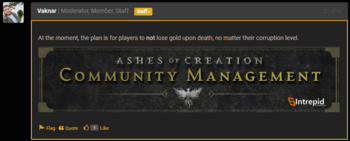
- ↑ 71.0 71.1 71.2 71.3 71.4 Livestream, March 26, 2021 (1:07:33).
- ↑ 72.0 72.1 72.2 72.3

- ↑ 73.0 73.1 73.2 73.3 73.4 Podcast, May 5, 2017 (43:05).
- ↑ Interview, June 13, 2021 (18:40).
- ↑ 75.0 75.1 75.2 Interview, July 9, 2023 (19:56).
- ↑ Livestream, August 31, 2023 (1:01:10).
- ↑ 77.0 77.1 77.2 77.3 Livestream, August 31, 2023 (1:05:23).
- ↑ 78.0 78.1 78.2 Video, November 30, 2023 (58:54).
- ↑ 79.0 79.1 79.2 79.3 79.4 79.5

- ↑ 80.0 80.1 80.2 Livestream, February 24, 2023 (1:12:24).
- ↑ 81.0 81.1 81.2 Livestream, October 28, 2022 (24:28).
- ↑ 82.0 82.1 82.2 Livestream, April 30, 2021 (1:14:49).
- ↑ 83.0 83.1 83.2 83.3 Interview, July 19, 2020 (1:12:37).
- ↑ 84.0 84.1 Livestream, November 17, 2017 (38:35).
- ↑ 85.0 85.1 Massively OP, 2017-06-1
- ↑ 86.0 86.1 86.2 86.3 86.4 Livestream, February 9, 2018 (20:40).
- ↑ 87.0 87.1 Livestream, May 10, 2017 (32:22).
- ↑ 88.0 88.1 Livestream, October 31, 2023 (1:21:02).
- ↑ 89.0 89.1 89.2 89.3 89.4 89.5 Livestream, August 26, 2022 (1:20:17).
- ↑ 90.0 90.1 90.2 Livestream, July 29, 2022 (3:21).
- ↑ 91.0 91.1 91.2 91.3 Livestream, January 29, 2021 (1:14:53).
- ↑ Video, September 6, 2018 (3:53).
- ↑ Livestream, July 9, 2018 (50:16).
- ↑ Livestream, May 15, 2017 (13:06).
- ↑ 95.0 95.1 Interview, July 18, 2020 (52:57).
- ↑ 96.0 96.1 96.2 Interview, August 24, 2018 (4:15).
- ↑ 97.0 97.1 Interview, February 7, 2021 (16:05).
- ↑ 98.0 98.1 Podcast, May 5, 2017 (43:05).
- ↑ 99.0 99.1 Interview, February 7, 2021 (19:00).
- ↑ 100.0 100.1 Video, June 30, 2023 (19:20).
- ↑ 101.0 101.1 Interview, December 6, 2018 (20:30).
- ↑ Video, May 31, 2020 (47:32).
- ↑ Livestream, June 30, 2023 (18:45).
- ↑ 104.0 104.1 104.2 Blog: Development Update with Village Node.
- ↑ Livestream, August 31, 2023 (50:25).
- ↑ 106.0 106.1 106.2 Livestream, 2018-04-8 (AM) (23:18).
- ↑

- ↑ Livestream, October 31, 2023 (1:08:57).
- ↑

- ↑

- ↑ Interview, September 10, 2023 (47:13).
- ↑ 112.0 112.1

- ↑ Interview, July 19, 2020 (41:32).
- ↑ Interview, July 9, 2023 (1:36:24).
- ↑ Livestream, October 14, 2022 (52:31).
- ↑ Podcast, September 29, 2021 (14:21).
- ↑ 117.0 117.1

- ↑ 118.0 118.1 Livestream, June 25, 2021 (22:34).
- ↑ 119.0 119.1 119.2 Livestream, July 30, 2021 (1:14:33).
- ↑ 120.0 120.1 120.2 120.3 Video, May 31, 2020 (47:32).
- ↑ Livestream, August 17, 2018 (10:54).
- ↑ Livestream, April 30, 2021 (1:12:33).
- ↑ 123.0 123.1 Livestream, June 26, 2020 (51:58).
- ↑ 124.0 124.1 Livestream, June 28, 2019 (1:23:31).
- ↑

- ↑
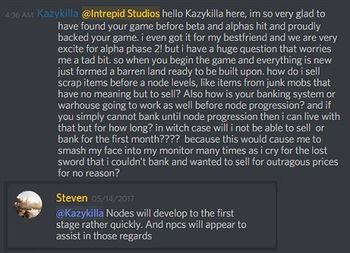
- ↑ Video, January 31, 2024 (29:15).
- ↑ Newsletter - January 2024.
- ↑ Video, January 31, 2024 (5:22).
- ↑ Livestream, October 31, 2023 (1:30:52).
- ↑ 131.0 131.1 131.2 131.3 131.4 131.5 131.6 Livestream, August 31, 2023 (2:10:23).
- ↑ 132.0 132.1 132.2 132.3 132.4 132.5 132.6 132.7 132.8 132.9 Video, July 15, 2019 (2:12).
- ↑ 133.0 133.1 Interview, May 11, 2018 (28:21).
- ↑ Livestream, May 15, 2017 (45:20).
- ↑ Livestream, January 31, 2024 (57:26).
- ↑ 136.0 136.1 Video, October 31, 2023 (10:13).
- ↑ Livestream, May 29, 2020 (46:36).
- ↑ Livestream, July 28, 2017 (20:56).
- ↑ Interview, March 27, 2020 (16:19).
- ↑

- ↑ Livestream, May 22, 2017 (40:40).
- ↑

- ↑ Video, October 31, 2023 (34:12).
- ↑ Podcast, April 11, 2021 (23:36).
- ↑ 145.0 145.1 Livestream, January 31, 2024 (1:15:05).
- ↑ Video, October 31, 2023 (29:36).
- ↑ Livestream, January 29, 2021 (1:25:14).
- ↑ Video, October 31, 2023 (27:40).
- ↑ 149.0 149.1 149.2 Livestream, July 28, 2017 (19:43).
- ↑ Video, October 31, 2023 (13:32).
- ↑

- ↑ 152.0 152.1 152.2 152.3 152.4 Livestream, April 30, 2020 (58:05).
- ↑ Video, September 29, 2023 (2:59).
- ↑ Video, January 31, 2024 (15:35).
- ↑ Video, January 31, 2024 (15:27).
- ↑ 156.0 156.1 Video, October 31, 2023 (28:06).
- ↑ 157.0 157.1 Livestream, 2018-04-8 (AM) (15:46).
- ↑ Livestream, May 29, 2020 (1:28:38).
- ↑ Livestream, January 31, 2024 (1:07:587).
- ↑ Livestream, January 31, 2024 (1:08:47).
- ↑

- ↑ Video, November 30, 2023 (38:08).
- ↑

- ↑ 164.0 164.1 Livestream, November 30, 2023 (1:34:25).
- ↑ 165.0 165.1 Livestream, May 24, 2017 (32:07).
- ↑ Podcast, April 11, 2021 (44:29).
- ↑ 167.0 167.1 167.2 Livestream, April 29, 2022 (1:13:00).
- ↑

- ↑ Livestream, July 26, 2019 (1:09:46).
- ↑ Video, November 30, 2023 (16:40).
- ↑

- ↑ 172.0 172.1 Livestream, April 7, 2023 (1:00:55).
- ↑ Livestream, October 28, 2022 (1:32:38).
- ↑ Livestream, July 31, 2020 (1:31:11).
- ↑ Podcast, December 3, 2023 (15:05).
- ↑ Video, November 30, 2023 (36:00).
- ↑ Livestream, July 18, 2017 (37:25).
- ↑ 178.0 178.1 178.2 Livestream, February 24, 2023 (1:18:05).
- ↑ 179.0 179.1 Livestream, August 28, 2020 (2:05:21).
- ↑ Podcast, December 3, 2023 (16:06).
- ↑ Interview, July 20, 2020 (20:17).
- ↑ 182.0 182.1 182.2 182.3 Livestream, May 10, 2017 (8:22).
- ↑ Livestream, May 10, 2017 (6:12).
- ↑ 184.0 184.1 184.2 184.3 184.4 184.5 184.6 184.7 Livestream, May 8, 2017 (20:41).
- ↑ Livestream, July 18, 2017 (38:30).
- ↑ Livestream, May 26, 2017 (26:00).
- ↑ Interview, May 11, 2018 (24:18).
- ↑ 188.0 188.1 188.2 188.3 188.4 188.5 188.6 188.7 Video, August 31, 2023 (28:04).
- ↑ Livestream, March 28, 2020 (1:03:38).
- ↑

- ↑

- ↑ 192.0 192.1 Interview, July 9, 2023 (54:46).
- ↑ 193.0 193.1 193.2 Livestream, June 30, 2023 (1:45:22).
- ↑ 194.0 194.1 194.2 194.3

- ↑ Livestream, August 31, 2023 (15:51).
- ↑ 196.0 196.1 Interview, July 9, 2023 (38:14).
- ↑ 197.0 197.1 Interview, March 27, 2020 (0:30).
- ↑ Video, April 5, 2018 (41:48).
- ↑ Livestream, September 29, 2023 (1:11:22).
- ↑ 200.0 200.1 Livestream, August 26, 2022 (1:10:16).
- ↑ 201.0 201.1 Interview, May 11, 2018 (57:02).
- ↑

- ↑ 203.0 203.1 203.2 203.3 203.4 203.5 203.6 203.7 203.8 Blog: Exploring the Boundless Opportunities of Freeholds.
- ↑

- ↑ 205.0 205.1 Livestream, August 31, 2023 (24:13).
- ↑ Livestream, July 28, 2023 (1:29:07).
- ↑ Livestream, May 24, 2017 (42:22).
- ↑ 208.0 208.1 Blog: 10 facts about castle sieges in the MMORPG.
- ↑ 209.0 209.1 209.2 209.3 Livestream, April 30, 2021 (1:01:10).
- ↑

- ↑ Livestream, August 28, 2020 (1:39:02).
- ↑

- ↑

- ↑

- ↑

- ↑

- ↑ Interview, July 30, 2020 (16:17).
- ↑ Interview, July 18, 2020 (55:01).
- ↑ 219.0 219.1 219.2 Livestream, May 28, 2021 (1:53:04).
- ↑ 220.0 220.1 220.2 220.3 220.4 Interview, February 7, 2021 (13:14).
- ↑ 221.0 221.1 221.2 221.3 221.4 Podcast, 2017-05-13 (25:55).
- ↑ 222.0 222.1

- ↑ 223.0 223.1 223.2 223.3 Interview, July 29, 2020 (16:46).
- ↑ Livestream, August 28, 2020 (2:05:07).
- ↑ 225.0 225.1 Podcast, September 29, 2021 (32:35).
- ↑ Interview, July 19, 2020 (51:11).
- ↑ Interview, July 29, 2020 (15:04).
- ↑ Livestream, May 5, 2017 (20:41).
- ↑ 229.0 229.1

- ↑ Livestream, July 30, 2021 (1:16:05).
- ↑

- ↑ Interview, October 20, 2018 (2:53:52).
- ↑ 233.0 233.1 233.2

- ↑ 234.0 234.1 234.2 Interview, July 9, 2023 (1:47:04).
- ↑

- ↑ 236.0 236.1 236.2 236.3 Livestream, August 26, 2022 (1:32:45).
- ↑ 237.0 237.1 237.2 Livestream, October 28, 2022 (29:32).
- ↑ 238.0 238.1 238.2 238.3 Interview, July 8, 2020 (48:30).
- ↑ Livestream, October 28, 2022 (13:53).
- ↑

- ↑

- ↑ Forums - Livestream Q&A 2022-08-26.
- ↑ Interview, August 21, 2018 (40:44).
- ↑ Interview, July 19, 2020 (1:10:55).
- ↑ Livestream, October 14, 2022 (57:22).
- ↑ 246.0 246.1 246.2 246.3 246.4 246.5 Interview, July 19, 2020 (1:08:22).
- ↑ Interview, July 18, 2020 (10:04).
- ↑ Interview, July 8, 2020 (1:00:15).
- ↑ Video, January 27, 2023 (16:44).
- ↑ 250.0 250.1

- ↑ Livestream, May 3, 2017 (35:25).
- ↑ Interview, July 18, 2020 (1:00:15).
- ↑ Ashes of Creation Forums - Former Lineage 2 PvP'er wanting to discuss PvP loopholes.
- ↑ 254.0 254.1 Interview, July 19, 2020 (8:43).
- ↑ February 8, 2019 - Questions and Answers.
- ↑ Interview, July 20, 2020 (21:57).
- ↑ Livestream, 2018-04-8 (PM) (55:49).
- ↑ Livestream, July 25, 2020 (46:08).
- ↑ Livestream, December 22, 2020 (1:15:01).
- ↑ Livestream, May 27, 2022 (1:14:46).
- ↑ Video, May 27, 2022 (2:21).
- ↑ 262.0 262.1 Livestream, February 29, 2024 (1:22:09).
- ↑ Podcast, August 4, 2018 (1:44:54).
- ↑ 264.0 264.1 264.2 Video, October 31, 2023 (4:45).
- ↑ 265.0 265.1 265.2 Video, October 31, 2023 (5:06).
- ↑ 266.0 266.1 Interview, April 17, 2019 (49:55).
- ↑ Video, October 31, 2023 (6:07).
- ↑ Video, October 31, 2023 (8:05).
- ↑

- ↑ 270.0 270.1 270.2 Livestream, June 4, 2018 (39:15).
- ↑ City hall.
- ↑ Livestream, August 31, 2023 (44:21).
- ↑ Livestream, 2018-04-8 (AM) (18:59).
- ↑ 274.0 274.1 274.2 274.3 Podcast, September 29, 2021 (8:38).
- ↑ 275.0 275.1 Video, May 27, 2022 (17:15).
- ↑ Livestream, May 17, 2017 (30:53).
- ↑ Kickstarter - We Just Broke $1,500,000!
- ↑ 278.0 278.1

- ↑ 279.0 279.1 Livestream, May 17, 2017 (11:27).
- ↑ 280.0 280.1 280.2

- ↑ 281.0 281.1 Interview, October 20, 2018 (5:51).
- ↑ 282.0 282.1

- ↑ 283.0 283.1 Livestream, June 26, 2020 (47:32).
- ↑ Livestream, June 26, 2020 (54:03).
- ↑ MMOGames interview, January 2017
- ↑ 286.0 286.1 Node series part II – the Metropolis.
- ↑ 287.0 287.1 287.2 287.3 Livestream, May 12, 2017 (55:01).
- ↑ 288.0 288.1 Livestream, June 30, 2023 (1:12:07).
- ↑ 289.0 289.1 Livestream, June 30, 2023 (14:09).
- ↑ 290.0 290.1 Livestream, June 30, 2023 (13:10).
- ↑ 291.0 291.1 Development Update with Freehold Preview.
- ↑ 292.0 292.1 Video, June 30, 2023 (21:22).
- ↑ 293.0 293.1 Livestream, June 26, 2020 (53:41).
- ↑ Interview, July 8, 2020 (33:34).
- ↑ Livestream, May 12, 2017 (52:01).
- ↑ Livestream, June 26, 2020 (1:02:12).
- ↑ 297.0 297.1 Livestream, June 30, 2023 (1:15:34).
- ↑

- ↑ Livestream, May 19, 2017 (32:23).
- ↑

- ↑ Livestream, June 26, 2020 (56:08).
- ↑ Livestream, June 30, 2023 (1:20:20).
- ↑ 303.0 303.1 Livestream, May 30, 2019 (1:23:41).
